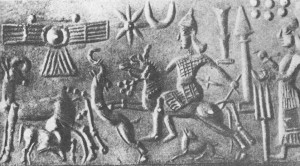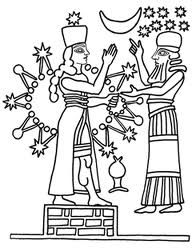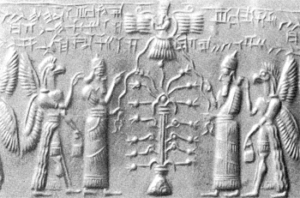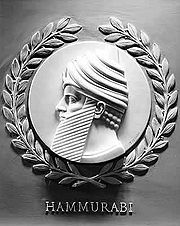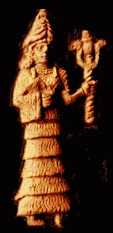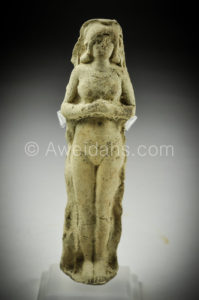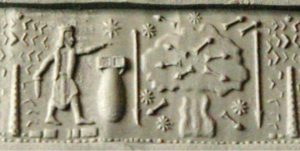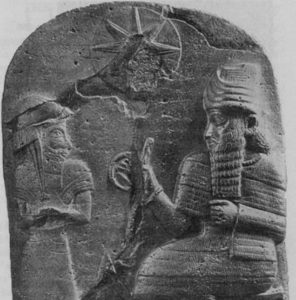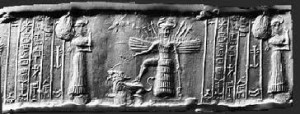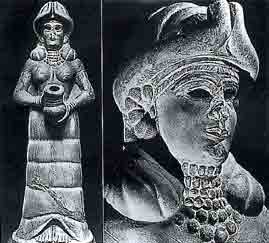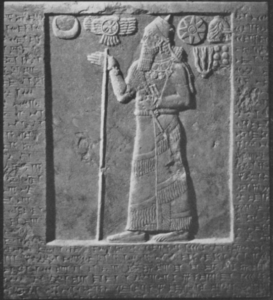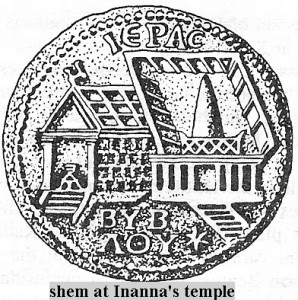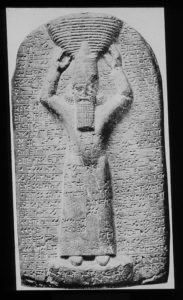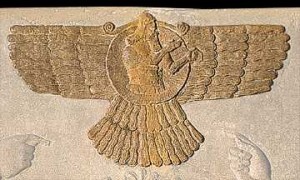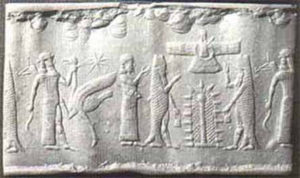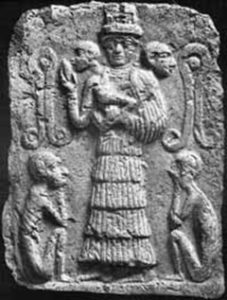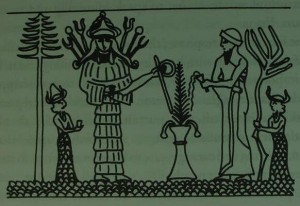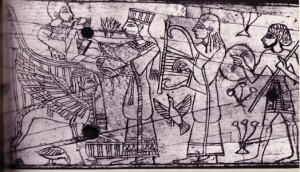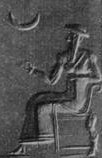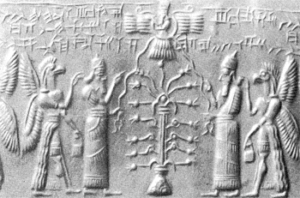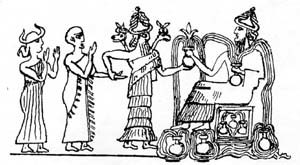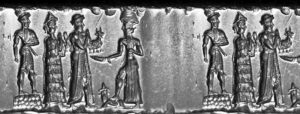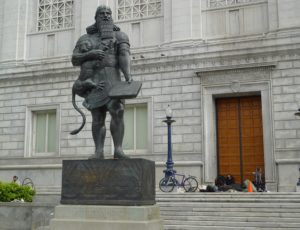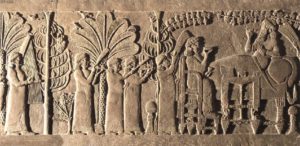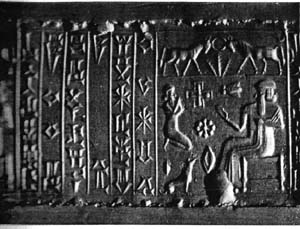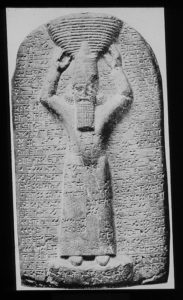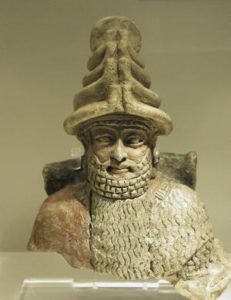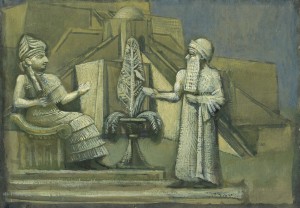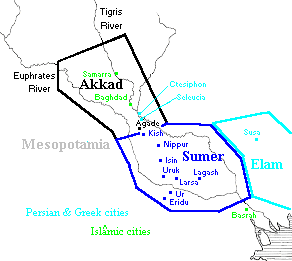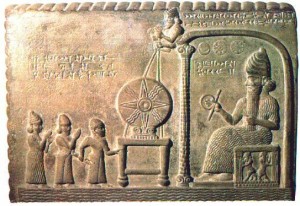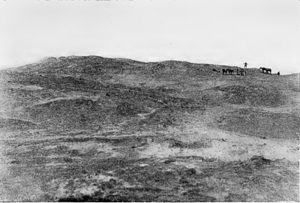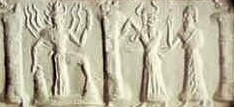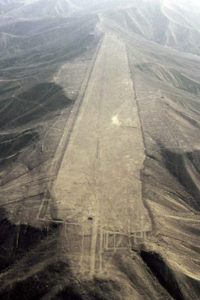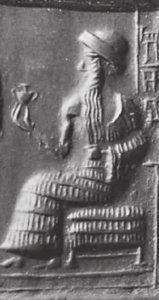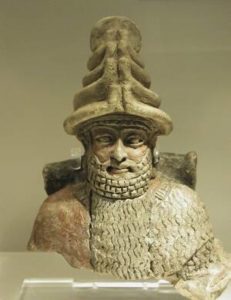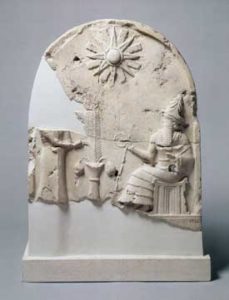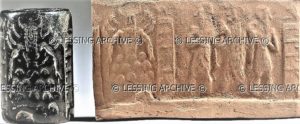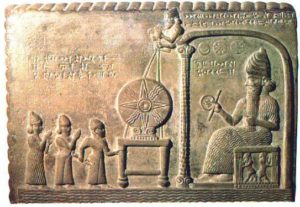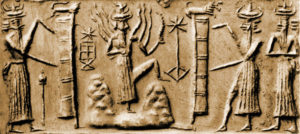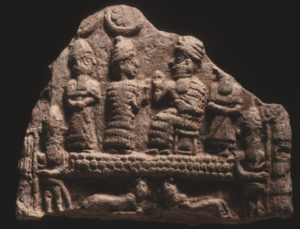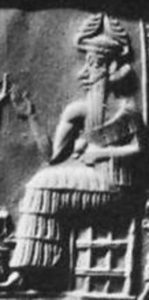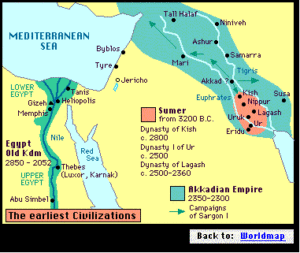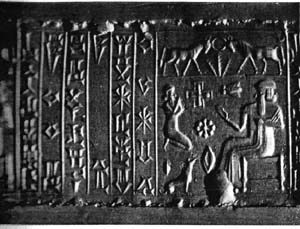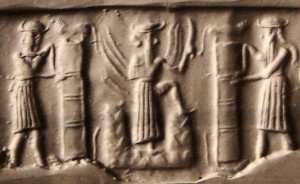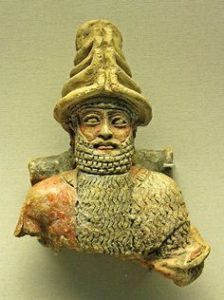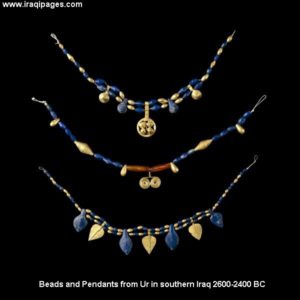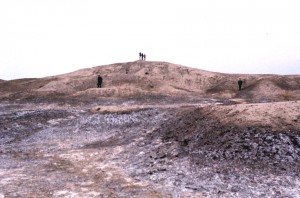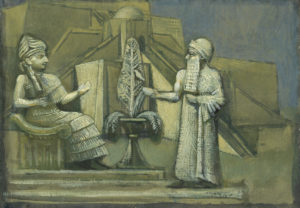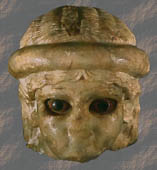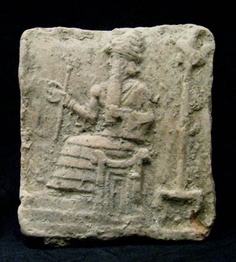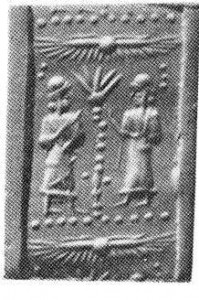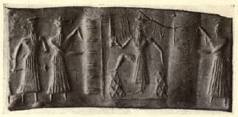(Texts: All Artifacts, Color Coding, & Writings in Bold Type With Italics Inside Parenthesis, are Added by Editor R. Brown, not the Authors, Translators, or Publishers!)
(gods in blue …mixed-breed demigods in teal…)
1-13Rim-Sîn, king of abundance, august doyen of rulers, may right and justice be your helpers.
May they make a good …… for you.
May they make …… for you.
Rim-Sîn, named with a name by An (Anu) and Enlil, when you enter the Great Gate, the gate of Urim (Ur),
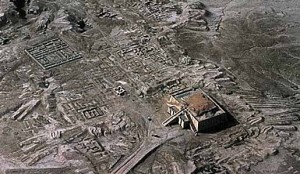 (Nannar’s ziggurat / residence way above his city of Ur)
(Nannar’s ziggurat / residence way above his city of Ur)
may the favorable protective god and the protective goddess of peace, gatekeepers of the Great Gate, shine upon you …….
May they bring you back an answer of life and peace ……

(Ningal, King Ur-Nammu & Ninsun, Ur-Nammu, Nannar, patron god of Ur)
to your greeting which they bring before Nanna (Nannar) and Ningal (Nannar’s spouse).
14-30 May they cause a good …… that brings happiness,
a mood of encouragement, to issue for you from within the E-kic-nujal.
May the gods of life of the Great Gate open the doors for you.
May the gods of peace, guardians of the Great Gate, rejoice at your presence, and may their features light up at you.
May they …… their beards …… for you.
When you enter the Gate of Urim (Ur), the Gate of Splendor,
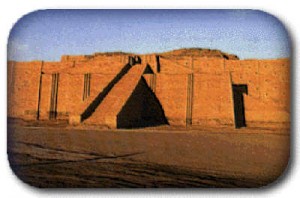 (Ur temple with stairway to heaven / god / Nannar)
(Ur temple with stairway to heaven / god / Nannar)
…… the brickwork of Urim.
…… the Gate of Urim.
…… the Great Gate.
May …… be your interpreter (?).
…… the Great Gate.
May they speak to you …….
May they cause …… for you with joyous hearts.
31-48 May they set favorable signs and encouraging words before you.
May they cause you to place your feet in holy places, places of life.
O Rim-Sîn, pre-eminent prince of the foreign lands and of the Land of Sumer! —
in the Dul-barag-gal-mah, the habitation of Urim, may Nijerim-cu-tabbi (unidentified?) in the Dul-barag-gal-mah,
may Nijerim-cu-urur (unidentified?) in the Dul-barag-gal-mah, may Dugab-cu-gigi (unidentified?) in the Dul-barag-gal-mah,
may Dugab-cu-tabbi (unidentified?) in the Dul-barag-gal-mah —
may they, the standing gods of the Great Gate and the benevolent gods of entering,
stand at your right and left to assure you a destiny of life until distant days.
May they bring your greeting to Nanna and Ningal.
May they cause you to have a favorable sign permanently by your side and to receive offerings (?) favorable for you.
Rim-Sîn, you are my king!
49 A prayer to the gods of peace on entering the Great Gate.
A prayer for Rim-Sin (Rim-Sin E): translation
The Electronic Text Corpus of Sumerian Literature,
(Any writing in Bold Type, in Parenthesis, in Italics, & pictures are added by me, R. Brown, not the author!)
(gods in blue …mixed-breed demigods in teal...)
1-7 ……, who is fitted for holy lustration rites,
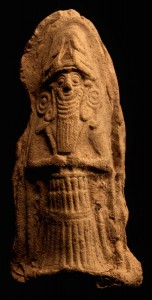 (alien King Anu, father in heaven / planet Nibiru to those descendants who came down)
(alien King Anu, father in heaven / planet Nibiru to those descendants who came down)
Rim-Sîn, purification priest of An (Anu), who is fitted for pure prayers rites, whom you summoned from the holy womb ……,
has been elevated to lordship over the Land; he has been installed as shepherd over the black-headed (the earthlings).
The staff which strengthens the Land has been placed in his hand.
The shepherd’s crook which guides the living people has been attached at his side.
As he steps forward before you, he is lavishly supplied with everything that he offers with his pure hands.
8-20 Your attentive youth, your beloved king, the good shepherd Rìm-Sîn,
who determines what should be brought as offerings for his life,
joyfully pours out offerings for you in the holy royal cultic locations which are perfect for the cultic vessels:
sweet-smelling milk and grain, rich produce of the Land, (food & drink for the mortal alien gods)
riches of the meadows, unending abundance, alcoholic drink, glistening wine,
very sweet emmer beer fermented with pure substances,
pure …… powerful beer made doubly strong with wine, a drink for your lordship;
double-strength beer, superior beer, befitting your holy hands,
pale honey exported from the mountains, which you have specifically requested,
butter from holy cows, ghee as is proper for you as prince; pressed oil, best oil of the first pressing,
and yellow cream, the pride of the cow-pen, for the holy abode of your godhead.
21-26 Accept from him with your joyful heart pure food to eat as food,
and pure water to drink as water: offerings made for you.
Grant his prayer: you are indeed respected.
When he humbly speaks fair words to you, speak so that he may live.
Guide him correctly at the holy lordly cultic locations, at the august lordly cultic locations.
Greet him as he comes to perform his cultic functions.
27-37 May his kingship exist forever in your presence.
May he be the first of the Land, called (?) lord and prince.
Following your commands he shall be as unshakeable as heaven and earth; may he be …… over the numerous people.
May the mother goddesses among the gods attend to his utterances;
may they sit in silence before that which he says, and bring restorative life.
May he create heart’s joy for the population, and be the good provider for their days.
May the terrifying splendor that he wears cover like a heavy raincloud the king who is hated by him.
May all the best what he has be brought here as their offerings.
38-52 The good shepherd Rim-Sîn looks to you as to his personal god.
Grant him …… a life that he loves, and bestow joy on him.
May you renew it like the daylight.
As he prays to you, attend to his …….
When he speaks most fair words to you, sustain his life power for him.
May he be respected ……, and have no rivals.
As he makes supplication to you, make his days long.
In the …… of life, …… the power of kingship.
May his correct words be ever …….
May he create heart’s joy in his ……. …… make the restorative …… rest upon him, the lion of lordship.
When he beseeches you, let his exterior (?) …… shine.
Give him …… life …….
May you bring …… for his life with your holy words.
Hear him favorably as he lifts his hands in prayer, and decide a good destiny for him.
53-69 As his life ……, so may it delight his land.
Cast the four quarters at his feet, and let him be their ruler.
Reclining in meadows in his own land, may he pass his days joyously with you …….
In the palace, lengthen the days and reign of Rim-Sîn, your compliant king who is there for you; whose name you,
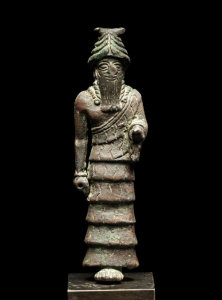
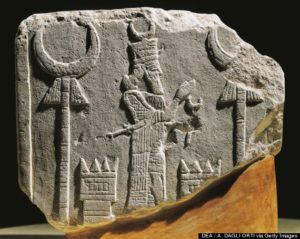
(Nannar, son to Commander Prince Enlil; Nannar atop his residence in Ur, with his moon crescent symbols of then & now)
Acimbabbar (Nannar), have named, …… life.
…… the august good headdress.
…… due praise for his life.
…… the throne, and may the land be safe.
May satisfaction and joy fill his heart.
May …… be good for his …….
Place in his hand the scepter of justice; may the numerous people be bound (?) to it.
Shining brightly, the constant …… in his …….
Confer on him the benefit of months of delight and joy,
and bestow on him numerous years as infinite in number as the stars in the lapis-lazuli colored heavens.
In his kingship may he enjoy a happy reign forever.
70-85 May you preserve the king, the good provider.
May you preserve Rim-Sîn, the good provider.
May his reign be a source of delight to you.
Lengthen the days of his life, and give him kingship over the restored land.
For him gladden the heart of the land, for him make the roads of the land passable.
For him make the Land speak with a single voice.
May you preserve alive Rim-Sîn, your shepherd with the compliant heart.
May his canals bring water for him, and may barley grow for him in the fields.
May the orchards and gardens bring forth syrup and wine for him,
and may the marshes deliver fish and fowl for him in abundance.
May the cattle-pens and sheepfolds teem with animals,
and may rain from the heavens, whose waters are sporadic, be regular for him.
May the palace be filled with long life.
O Rim-Sîn, you are my king!
A prayer for Rim-Sîn (Rim-Sîn F): translation
The Electronic Text Corpus of Sumerian Literature,
(Any writing in Bold Type, in Parenthesis, in Italics, & pictures are added by me, R. Brown, not the author!)
(gods in blue …mixed-breed demigods in teal...)
1-12 Rim-Sîn, king with princely divine powers (alien technologies), leader with all the divine powers, raising high your princely head!
The abzu is the august holy shrine of the E-kic-nujal, a great vastness in depth and breadth,
the foundation of the innermost holy pure buildings, with a pleasant odor like a forest of aromatic cedars and hachur trees.
It forms the foundations (?) of the temple, within the temple, a protection for the temple;
the terrifying splendor of the temple, a great corner, a holy corner within the solid interior.
The design of the doorway is a magic bond: a solar disc at whose top is a standard representing a rapacious eagle,
violently seizing stags which turn to the left and right.
Gods stand guard over the doorway.
13-27 In this place, you see numerous tall birch trees.
The door frame, the architrave, the lock, the fence (?) around the threshold,
the door-leaves, the bolt, the bar of the temple, the supporting wall of the temple terrace,
foundation of the innermost holy pure buildings — all these are of very holy reeds, golden yellow or silver white.
Beside the marsh of the abzu of the E-kic-nujal, in the holy enclosure where cattle mill about,
for the many lustrous bull-calves to receive their presents, the …… with their calves stand before you in the sacred …….
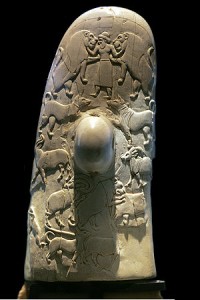 (Nannar protecting his many herds of cattle in Ur)
(Nannar protecting his many herds of cattle in Ur)
You see the old reeds, the old reeds in the water meadows ……,
the old lying reeds, the upright reeds …… well-established in these fields.
Within the marsh of the abzu of the E-kic-nujal,
the holy lagoon, the reed-beds in the holy water, you see the …… reeds growing.
28-38 Within the temple is the gateway of the great august sanctuary:
endowed with abundant charms like a fine woman whose head is nobly raised high,
whose attraction radiates as if with the maturity of fruit,
with abundant charms, lovable, but imposing in splendor like the hills.
In the midst, at the sides and in the four corners are august protective goddesses, foundations (?) of the statues.
Taking turns of office on the day of the new moon, the protective god and the protective goddess of the temple,
the serving deities, inhabitants of the temple, as guardians of the outer gateway and of the god’s pedestal,
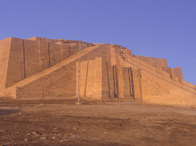
(gigantic sanctuary of the god of Ur, Nanna / Nannar / Suen / Sin, Biblical god El)
can be seen sweeping the ground of the building from the base of the enclosure wall,
in accordance with the sublime purification rites of the temple.
39-46 Its …… is an august protective goddess who indeed brings butter, cheese and loaves for you.
May the serving deities, the protective goddesses, the good mother goddesses, receive favorable offerings (?)
from you for their attention to the temple, so that when you light the wood of the censers,
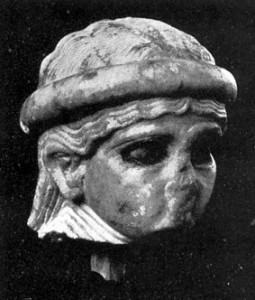
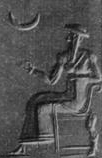
(Ningal, Nannar’s brown-eyed spouse; Nannar, prince son to Earth Colony Commander Enlil)
Nanna and Ningal accept your offering, and so that they pray for you with their holy words.
O Rim-Sîn, you are my king!
A prayer for Rim-Sin (Rim-Sin G): translation
The Electronic Text Corpus of Sumerian Literature,
(Any writing in Bold Type, in Parenthesis, in Italics, & pictures are added by me, R. Brown, not the author!)
(gods in blue …mixed-breed demigods in teal...)

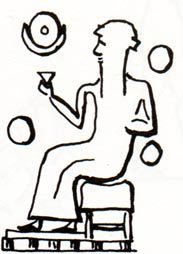 (Nanna, moon crescent patron god of Ur, city of Biblical Abraham, etc.)
(Nanna, moon crescent patron god of Ur, city of Biblical Abraham, etc.)
1-10 May lord Nanna (Nannar / Sin), king of heaven and earth, your good protective deity,
accept the holy food offerings that you prepare, and the holy pure drink offerings that you proffer with holy hands;
the sacrifices that you bring, what you say in your heart, what you utter out loud,
your reverent gestures and your holy hands raised in prayer.
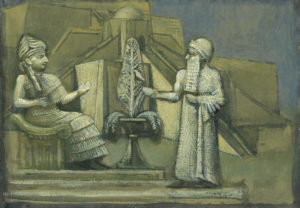
(Ningal & former Ur king Ur-Nammu standing before her, receiving his instructions inside the royal courtyard of Ur)
May the august queen Ningal, your queen of favorable signs, accept them also.
O king, they who have suppressed famine, the great gods Nanna and Ningal,
have conferred abundance on you, king Rim-Sîn, in the temple of the gods.
11-21 O king named with a name by Enlil, the destiny of whose reign is abundance, a time of richness and years of happiness!
May a destiny of stability and a destiny of abundance be your lot.
O king, day and night, even at dead of night,
time shall pass for you in endless abundance, and be agreeable and stable for you.
O king, since you have offered your food offerings first offered in the abzu;
o king, since you have offered your food offerings afterwards in the great courtyard,
there shall be no end to the abundance.
O King, the temple shall be well-organized for you.
Rim-Sîn, king of Urim (Ur), has restored the august divine powers of the Ki-ur.
22-38 May Nanna, the king of heaven and earth, fit perfectly onto your head the legitimate august headdress of kingship.
 (Nannar’s spouse Ningal, the royal princess brown-eyed beauty)
(Nannar’s spouse Ningal, the royal princess brown-eyed beauty)
May the august queen Ningal (Nannar’s spouse), who has saved you from famine thanks to her benignity,
let you live (?) an agreeable life for these days.
As you receive from her holy hands the great splendor of kingship,
may she place the august scepter of heaven and earth in your hands like a ceremonial robe.
Rim-Sîn, king of the Ki-ur, endowed with abundance, constant attendant!
O king, may the Tigris bring you abundance, and may the upper (?)
Nun canal be filled for you with flowing water in its full flood.
May the Nun canal, the good Nun canal, the life-bringing canal of the Land,
bring you fish and fowl; from the ocean, the wide sea, from the standing reservoirs,
may it bring an unending supply of creatures for your kingship.
In the wide open spaces of the wide desert, the four-footed animals …….
May water levels rise for you in the irrigation ditches, with their levees, and the water-channels.
39-51 May there be life for you, and may there be a favorable response to your prayers.
May there be joy for you, and may there be favorable signs for you.
May your heart be satisfied, may your body be satisfied;
may your mood and your definite signs from the gods be good.
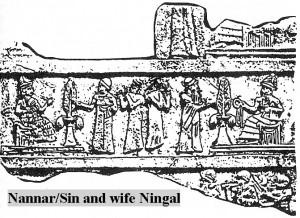
May there be favorable omens in the heart of Nanna and Ningal, and a destiny of life be granted for ever.
Rim-Sîn, seemly king, who holds abundance in his hands from the great gods,
may the country be stable for you, and may the foundations of the country be secure for you.
May Nanna, king of heaven and earth, cause the Land to respond to you with a single voice.
Rim-Sîn, you are my king!
Excerpt from a praise poem of Rim-Sîn: translation
The Electronic Text Corpus of Sumerian Literature,
(Any writing in Bold Type, in Parenthesis, in Italics, & pictures are added by me, R. Brown, not the author!)
(gods in blue …mixed-breed demigods in teal...)
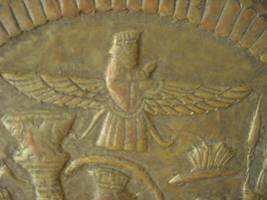 (King Anu of planet Nibiru in his winged sky-disc)
(King Anu of planet Nibiru in his winged sky-disc)
1-9 O An (Anu), strengthen the foundations of the throne of life.
Rim-Sîn, may your name be called by a name of life;
may he look upon you with favorable eyes, and pay attention to you.
1 line unclear
May he determine a destiny of life as a fate for you.
Rim-Sîn, may you be beloved of An, and may your kingship endure forever.
Great An, make him shepherd of the numerous people.
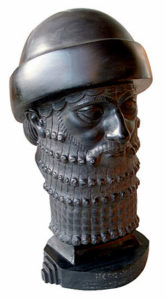
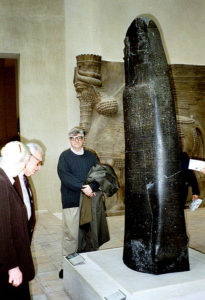 (Hammurabi & Law Code of Hammurabi artifact)
(Hammurabi & Law Code of Hammurabi artifact)